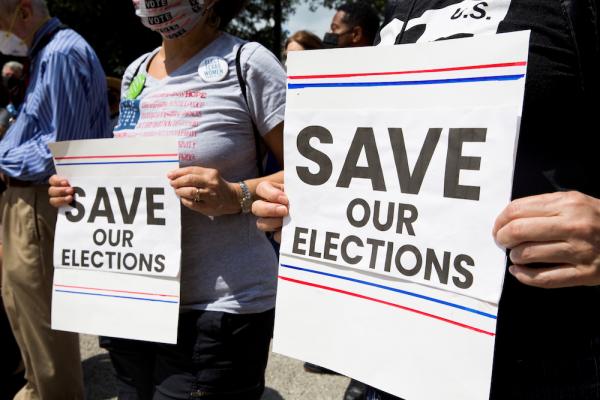Before the 2020 election, faith leaders and activists around the country sounded the alarm about how decades of voting rights rollbacks could result in enough suppressed votes to steal a presidential election. Barbara Williams-Skinner and I outlined exactly how voter disinformation and intimidation, closed polling sites, voter purges, and more were creating a democratic crisis. Thanks to massive local organizing, this dangerous scenario didn’t play out in November. Still, former President Donald Trump and his allies attempted to distract from legitimate concerns with baseless proclamations of widespread voter fraud, which culminated in the Big Lie of a stolen election, and ultimately, the Jan. 6 insurrection. We continue to see Republican blowback to the election results: GOP-controlled statehouses around the country are doubling down on voter suppression bills that, in a worst-case scenario, would enable legislatures to more easily overturn election results.
According to the Brennan Center for Justice, as of May 14, state legislators have introduced 389 bills with restrictive voting provisions in 48 states; 22 have already been enacted and 61 bills are currently moving through legislatures. This wave of bills — along with Republicans’ continued complicity in the Big Lie — means the GOP is increasingly seeking to narrow the electorate rather than appeal to a broader base of voters, particularly voters of color. With the changing demographics in this nation, this strategy will ultimately lead our nation down the destructive path of white minority rule and autocracy. Our entire democratic system is in jeopardy when politics focuses on fights over access rather than on policies to advance the common good. Because of the increasing spate of voting restrictions, what we feared could happen in the last election is now an even greater threat as we look forward to 2022 and 2024. The most effective antidote to the forces currently poisoning our democracy involves a procedural rule that has increasingly been used as a bludgeon to block progress: the filibuster.
The filibuster, a rule that has typically been used by minority parties to delay or block legislation, often by making long speeches, can easily seem like an arcane and distant issue. While there is a compelling case to end the filibuster, that will be difficult to near impossible any time soon. But the Senate could act with urgency to suspend the filibuster for bills that directly address voting rights and democracy reform; doing so may be the last hope in the short term to strengthen our democracy and prevent future elections from being stolen.
To understand this moral imperative, we must go back to the filibuster’s beginning. First, it is important to note that the practice is not ingrained in our Constitution; it is a Senate rule with a long but tainted history. While adopted in 1806 as a simple Senate rules change, the first filibuster did not happen until 1837 and wasn't widely used until after the Civil War when the Senate became larger and more polarized along party lines.
Investigating how and why the filibuster was used in the 20th century is deeply relevant to the current debate around voting rights: Beginning in 1946, Democratic senators from the South used the filibuster to successfully block a series of civil rights bills that were attempting to dismantle the legal architecture of Jim Crow segregation. In 1970, the Senate adopted a two-track system, so that filibusters on particular bills would no longer stop the Senate from doing any of its other business. Because a filibuster no longer brought all Senate business to a halt, it became politically much easier for the minority party to filibuster anything it opposed. And because overcoming a filibuster requires 60 votes, even the threat of one creates a roadblock in the Senate.
As many Senate Democrats push for ending this current roadblock by suspending the filibuster, all eyes are now upon Sen. Joe Manchin (D-W.V.). As one of the most outspoken moderate Democrats, he has taken a public stand against suspending the filibuster, seemingly based on an anachronistic view of Congress that ignores the reality that the majority of Republicans refuse to support meaningful voting rights and pro-democracy bills. For all his talk of good government and compromise, Manchin seems to miss that bipartisanship is not the goal in and of itself, particularly when achieving some semblance of it hijacks genuine efforts to protect the fundamental, sacred right to vote.
The very voting reforms that are desperately needed — and that almost all Republican senators oppose — would help incentivize the bipartisan solutions that Manchin holds as sacrosanct. These reforms would also steer our politics away from its current state of polarization that has been super charged by gerrymandered districts and unjust state election rules that fuel an “us versus them” and zero-sum politics. The John Lewis Voting Rights Advancement Act would restore the full protections of the bipartisan Voting Rights Act of 1965, which was gutted by the Supreme Court in 2013. In its ruling the Court made it clear that Congress can update the criteria for which states or jurisdictions must comply with “preclearance,” which would restore some of the Act’s original teeth.
The much more comprehensive For the People Act would expand and nationalize online voting, same-day registration, early voting, and no-excuse absentee voting, while restoring voting for former felons and preventing voter purges. The Act also contains important provisions to establish election integrity and security, set political spending limits, and create new ethics rules for federal officeholders. While Democrats should still try to move the John Lewis Voting Rights Act to a vote, the bill will almost assuredly fail to garner the 10 Republican votes needed to pass. It also would not take effect in time to reverse the slew of voter suppression laws that already threaten the outcome of the 2022 midterm election. Thus, the most viable way to move forward voting rights protections is through a narrow suspension of the filibuster to pass key reforms that are in both the John Lewis Act and the broader For the People Act.
Of course, I would love to see the filibuster suspended in a way that would allow a whole slate of legislation, including the George Floyd Justice in Policing Act, to move forward. But given our polarized politics, completely removing the filibuster contains real risks and appears to be a political nonstarter. We can make a more realistic and morally compelling case for the Democrat-controlled Senate to narrowly suspend the filibuster only for voting rights bills. Many Republicans have argued that the only reason Democrats want to expand voter access is because it will benefit them politically; essentially, Republicans argue that if more U.S. citizens vote, Democrats will win, so access should be limited. This is deeply immoral argument. If we truly believe in “one person, one vote” as the cornerstone of our democracy and that every person is made in the image of God, shouldn’t we all want to make voting more accessible and fair for everyone, regardless of party? I hope and pray that the GOP will shift its focus from a strategy of voter suppression to one of broader voter engagement and persuasion.
As Dr. Martin Luther King, Jr. wrote in his “Letter from a Birmingham Jail”:
A just law is a man made code that squares with the moral law or the law of God. An unjust law is a code that is out of harmony with the moral law. To put it in the terms of St. Thomas Aquinas: An unjust law is a human law that is not rooted in eternal law and natural law. Any law that uplifts human personality is just. Any law that degrades human personality is unjust.
In the context of our democratic system, any law that restricts the sacred right to vote is unjust because it denies citizens their agency and voice. Put in theological terms, unjust laws assault the imago dei, the core belief that every person is made in God’s divine image. What is true for unjust laws, is also true for unjust rules. In this case, a rule that is meant to encourage cooperation and ensure the minority party has a greater voice has become twisted for anti-democratic and immoral purposes, most pressingly to prevent reforms that would protect the right to vote.
The stalemate around voting rights raises the question: How do you overcome the political calculations of many Republican members of Congress who seek to hold onto power by any means necessary and to some Democrats who have failed to demonstrate enough political courage and will to safeguard our democracy? My best answer is still to galvanize enough moral pressure to either change their hearts or change their political calculations. Fortunately, there are many hopeful signs: The Poor People’s Campaign is planning a series of direct actions to support voting rights, including in West Virginia; Faithful Democracy organized a lobby day to push for the passage of the For the People Act; a group of Black pastors from Georgia are leading a prayer service and lobby day next week to push for the passage of the John Lewis Voting Advancement Act. And on June 28, Sojourners, the Skinner Leadership Institute, and the National African American Clergy Network will be hosting a “Faith United to Save our Democracy” national call to equip and mobilize faith leaders around the country to engage in nonpartisan voter registration, education, and advocacy efforts to protect the right to vote. These and other efforts will be needed to galvanize sufficient pressure on Manchin and other members of Congress to support a temporary suspension of the filibuster.
I can’t think of a more urgent moral cause right now than protecting the right to vote, which will then benefit almost every other justice cause. By suspending the filibuster to pass these voting rights protections and democracy reforms, perhaps we can imagine a day in the future when voting rights truly becomes a bipartisan cause and nonpartisan issue.
Got something to say about what you're reading? We value your feedback!






